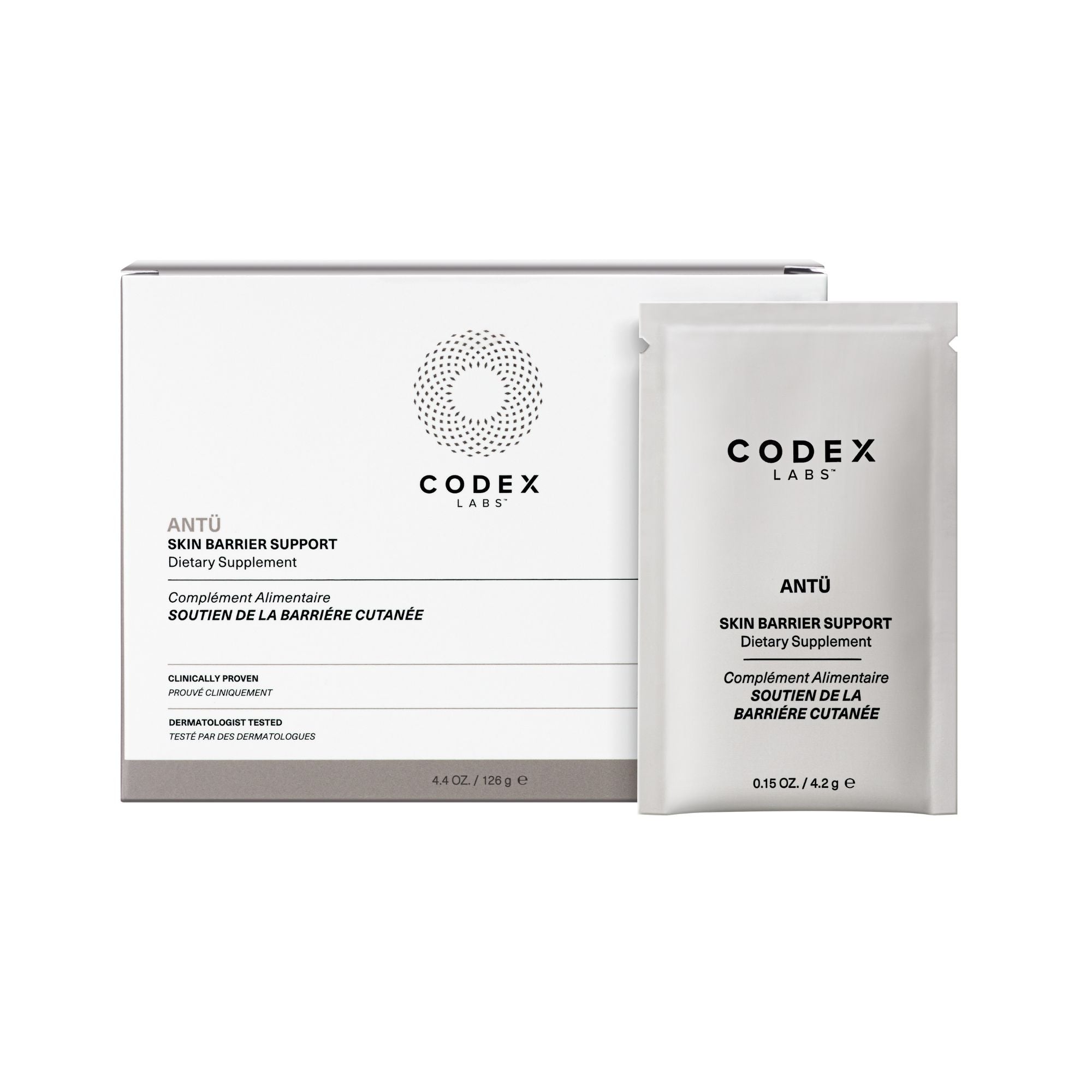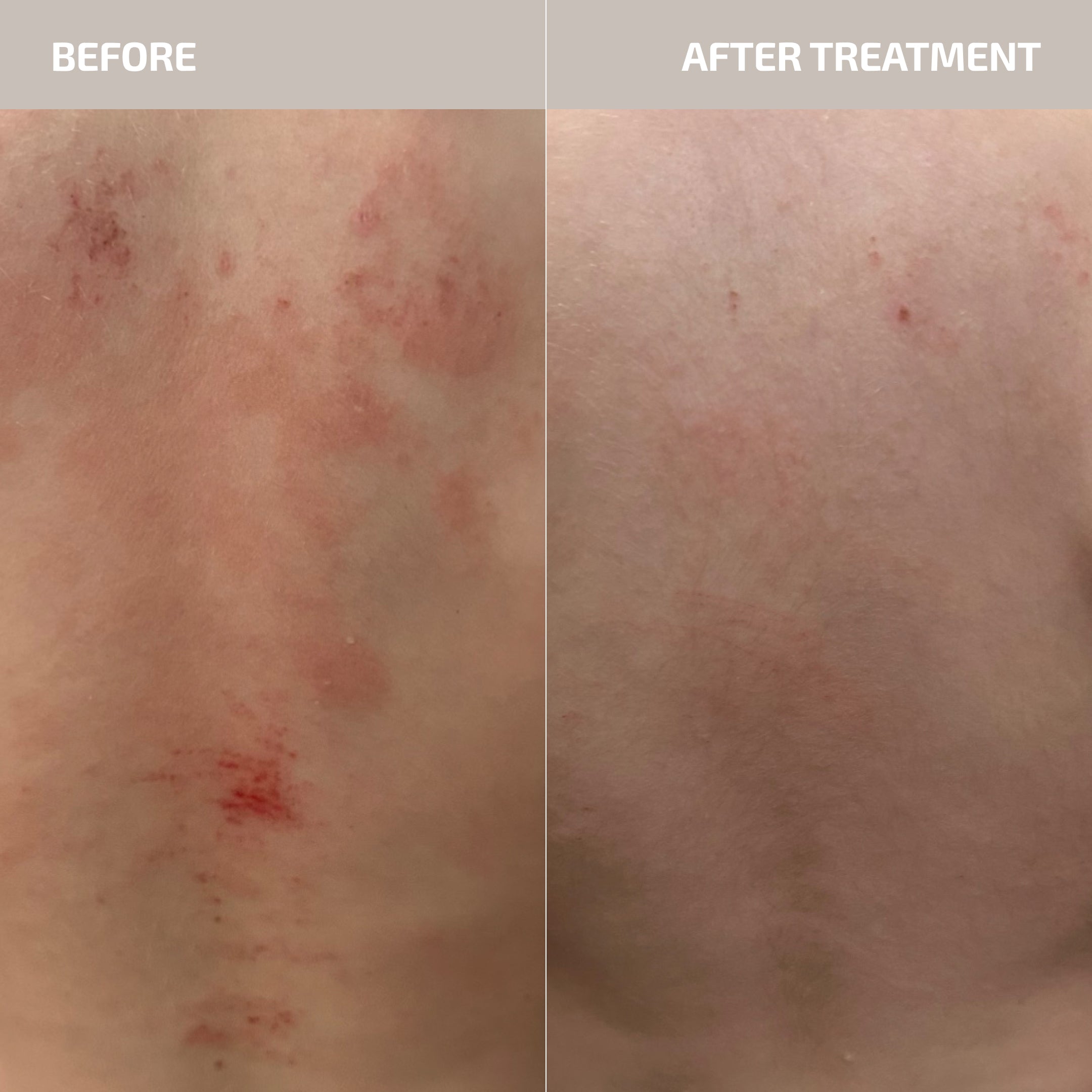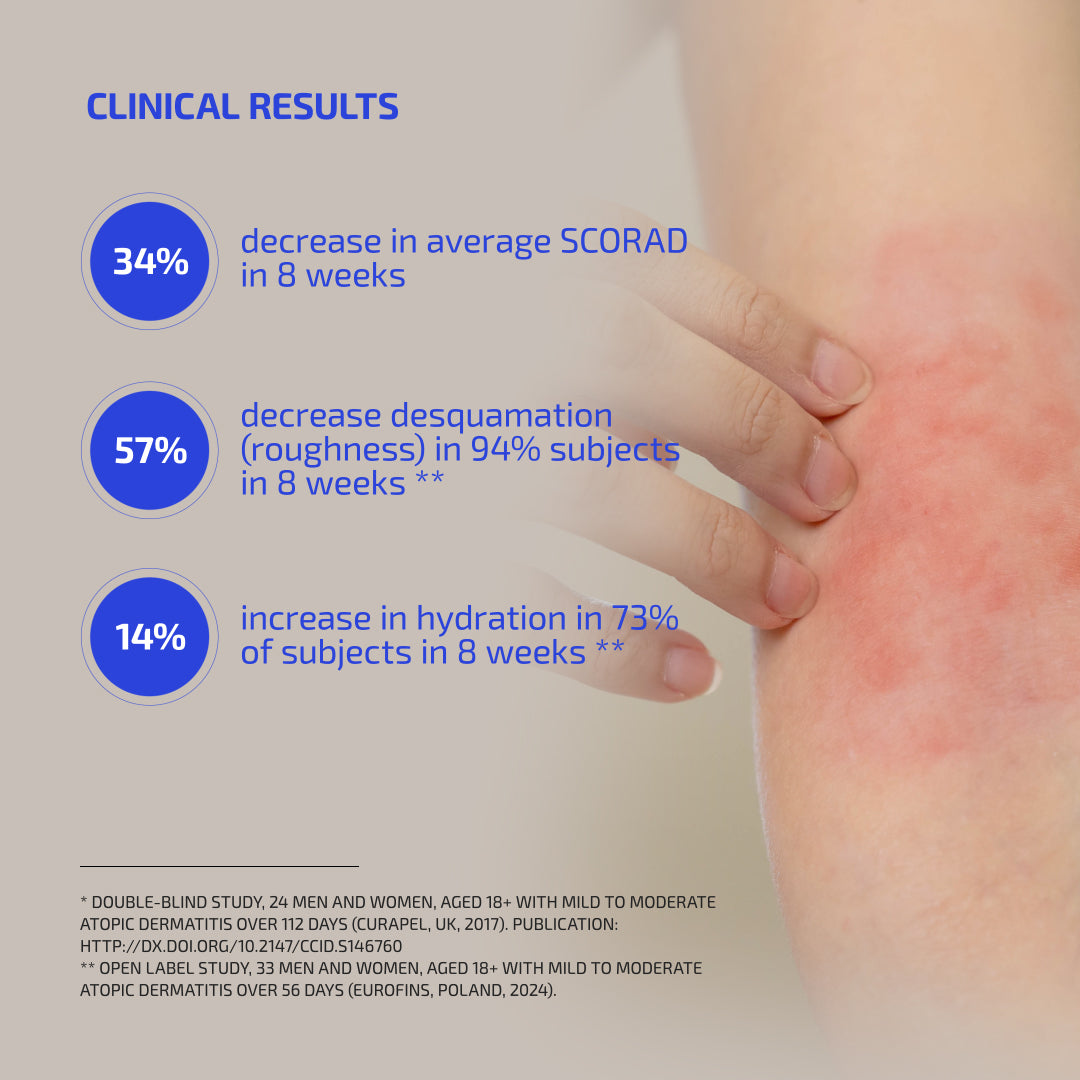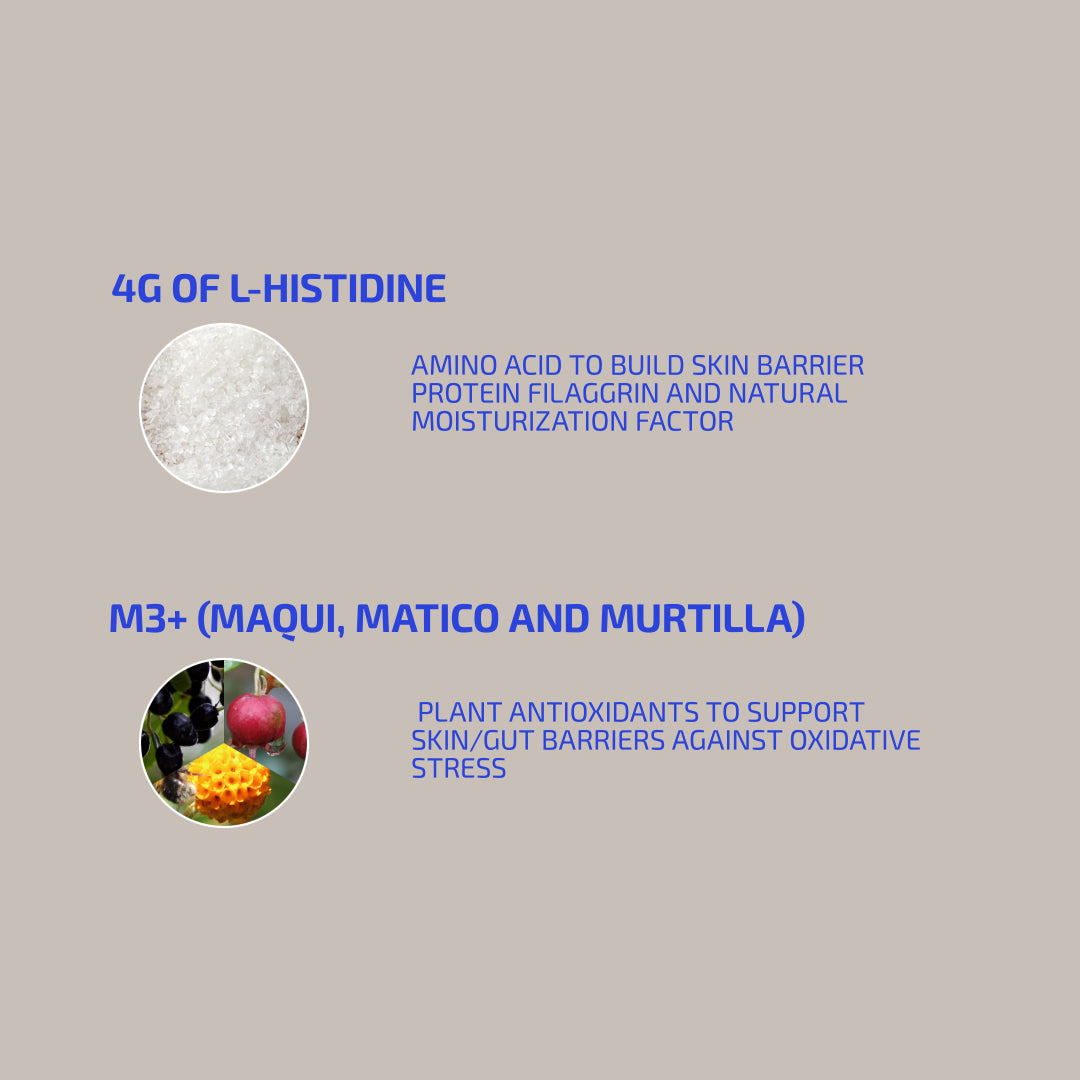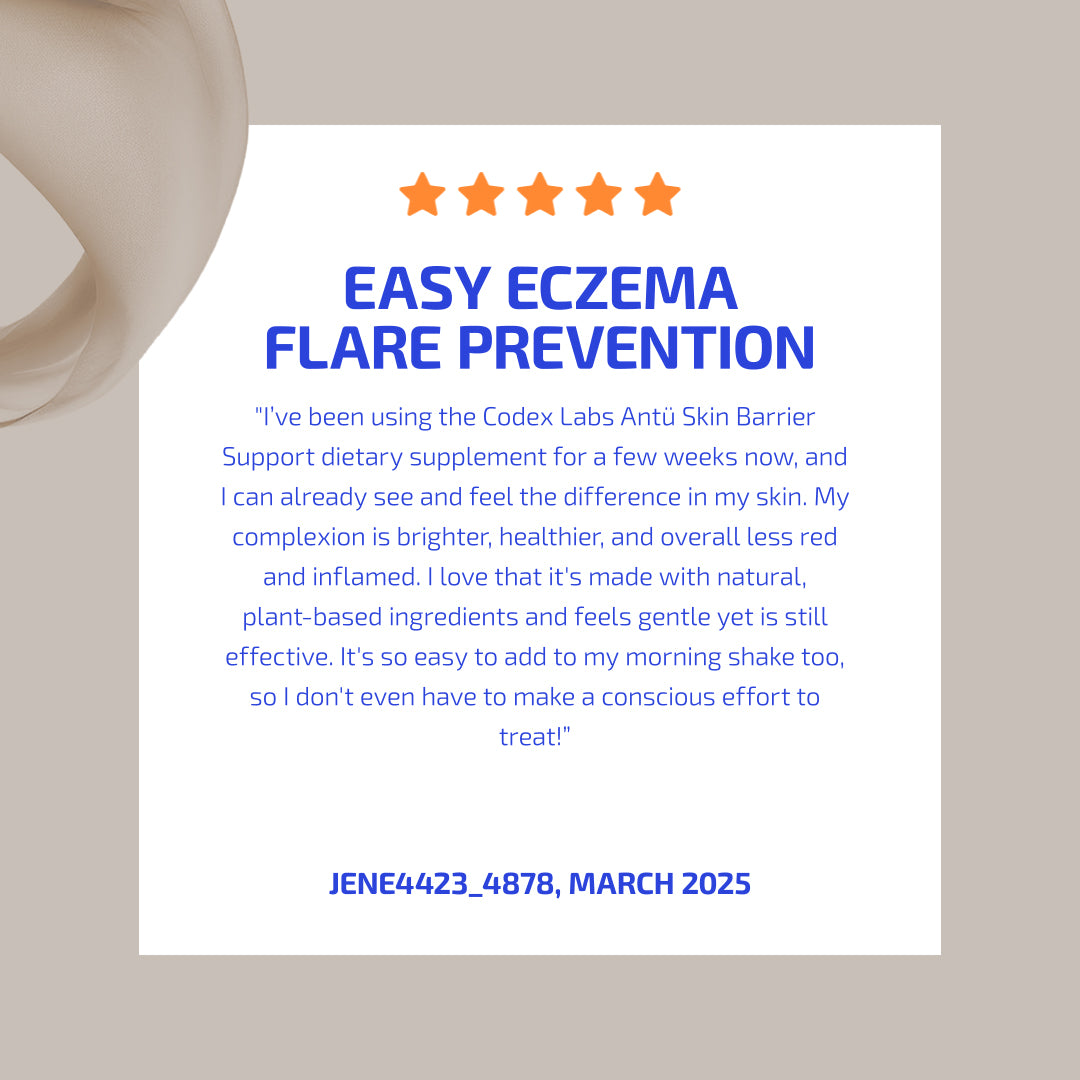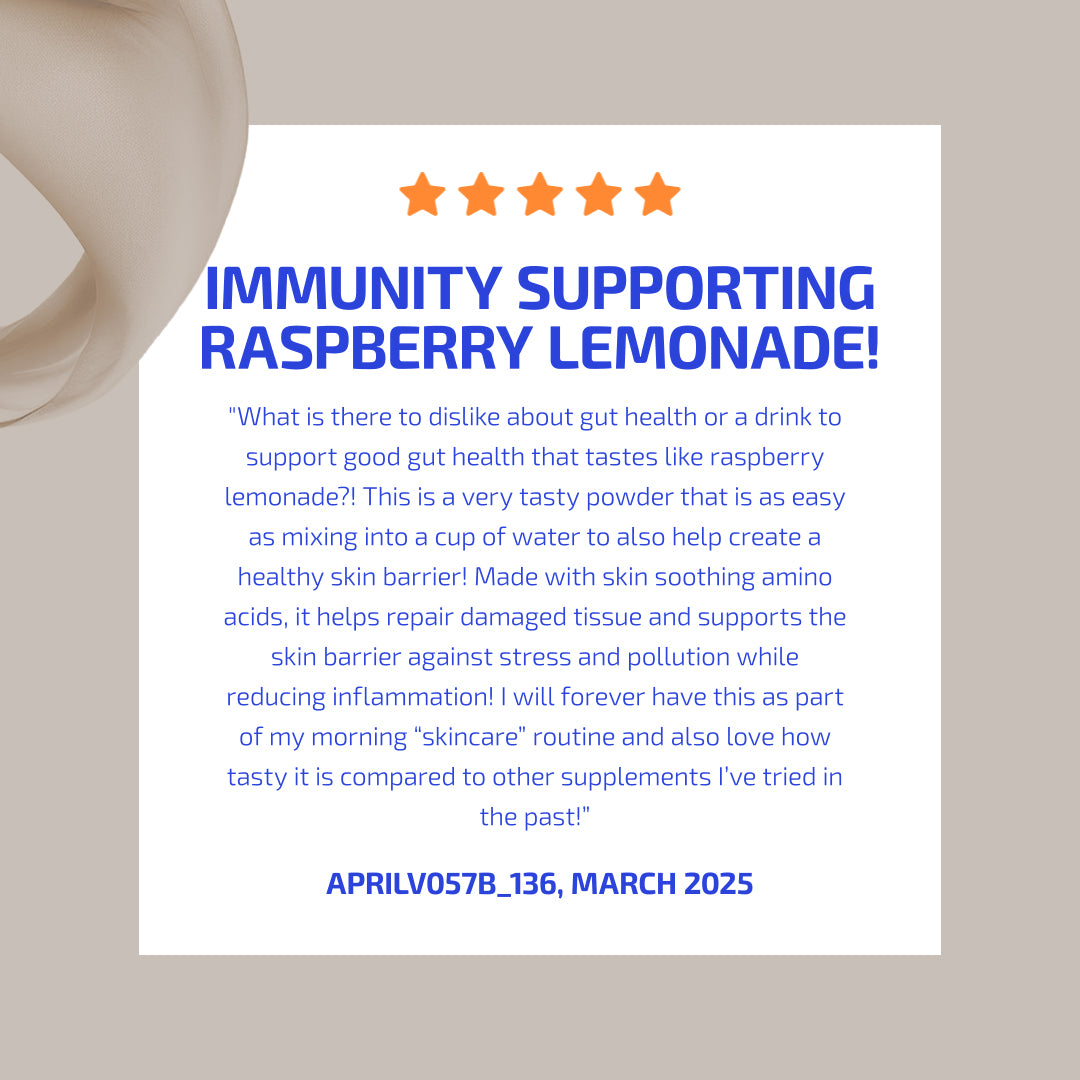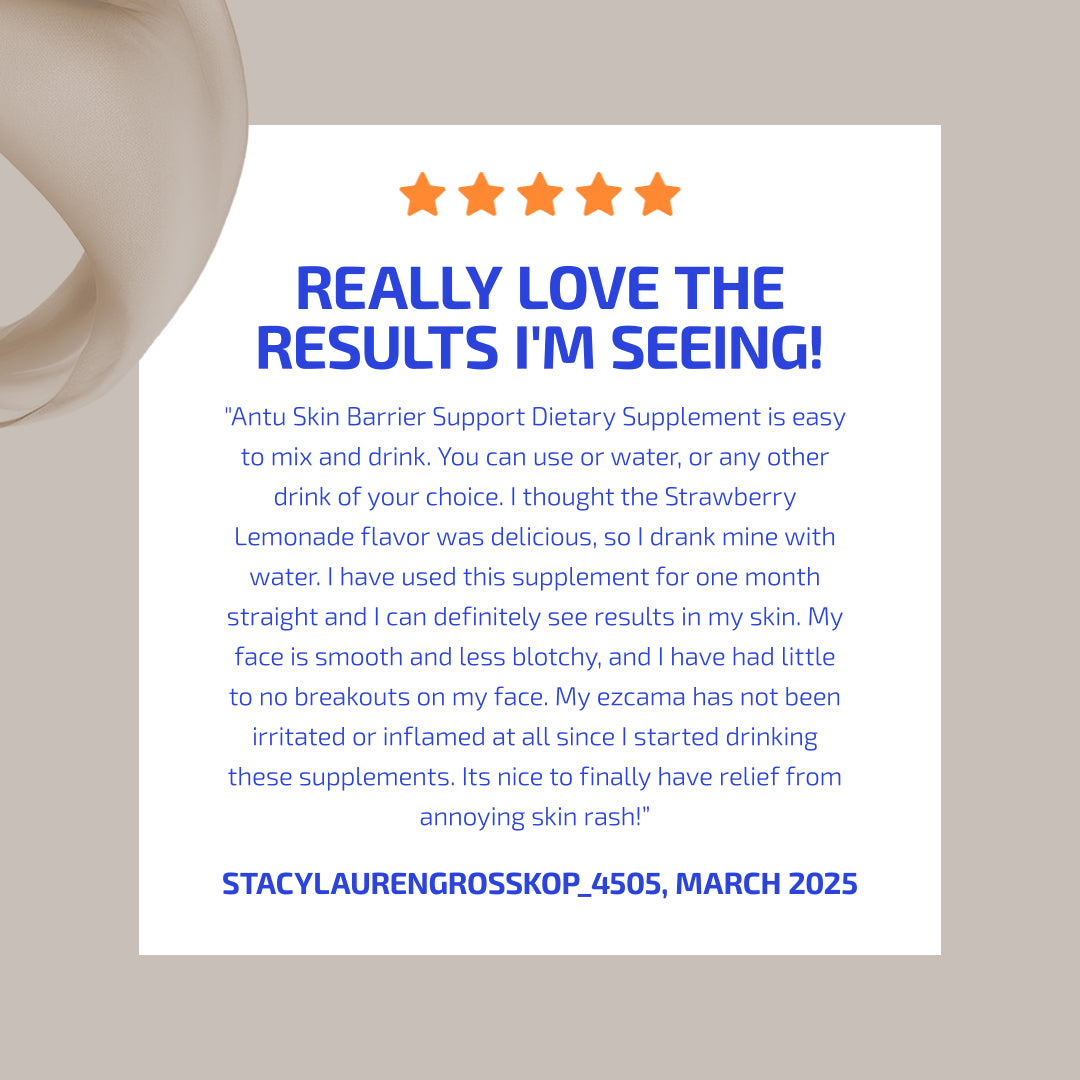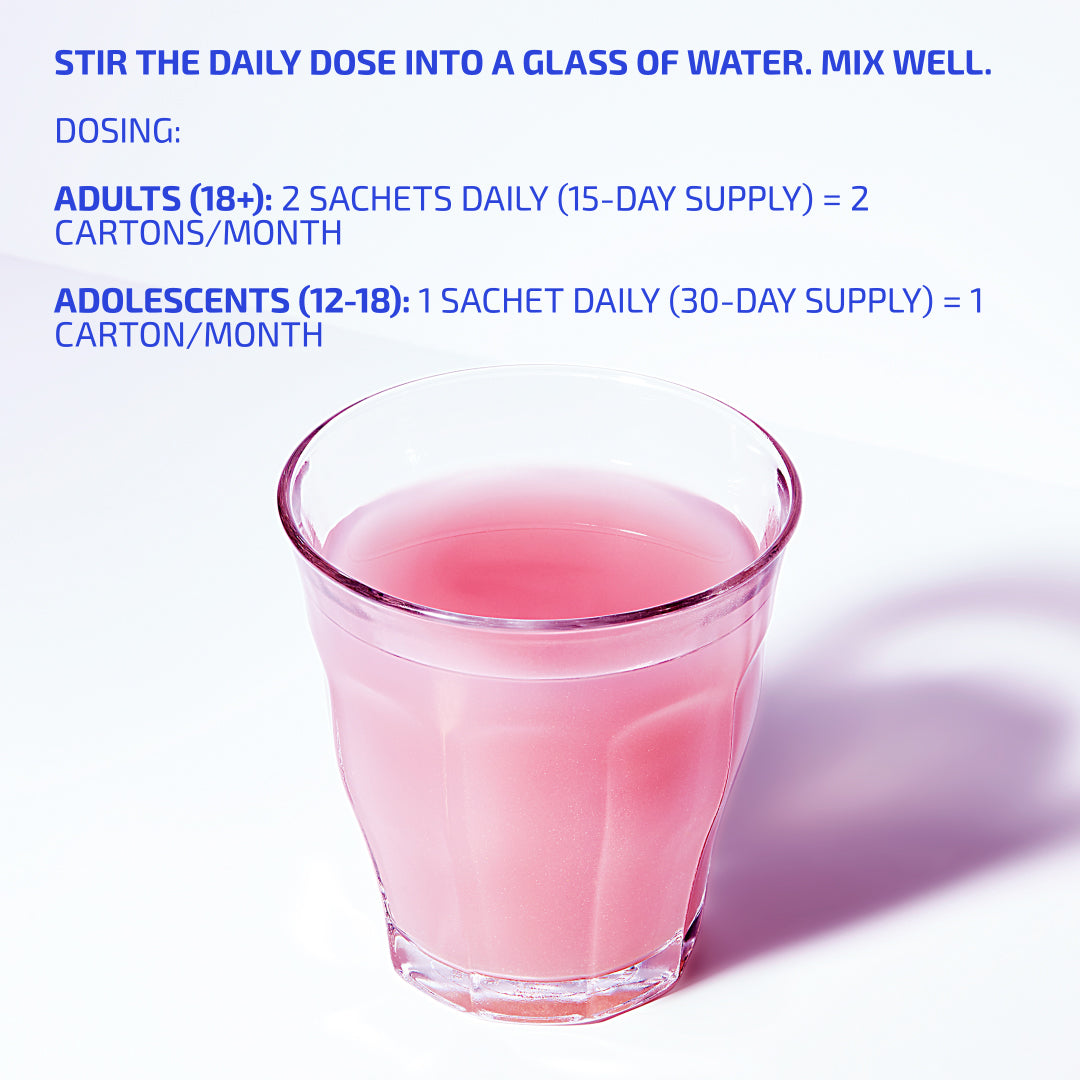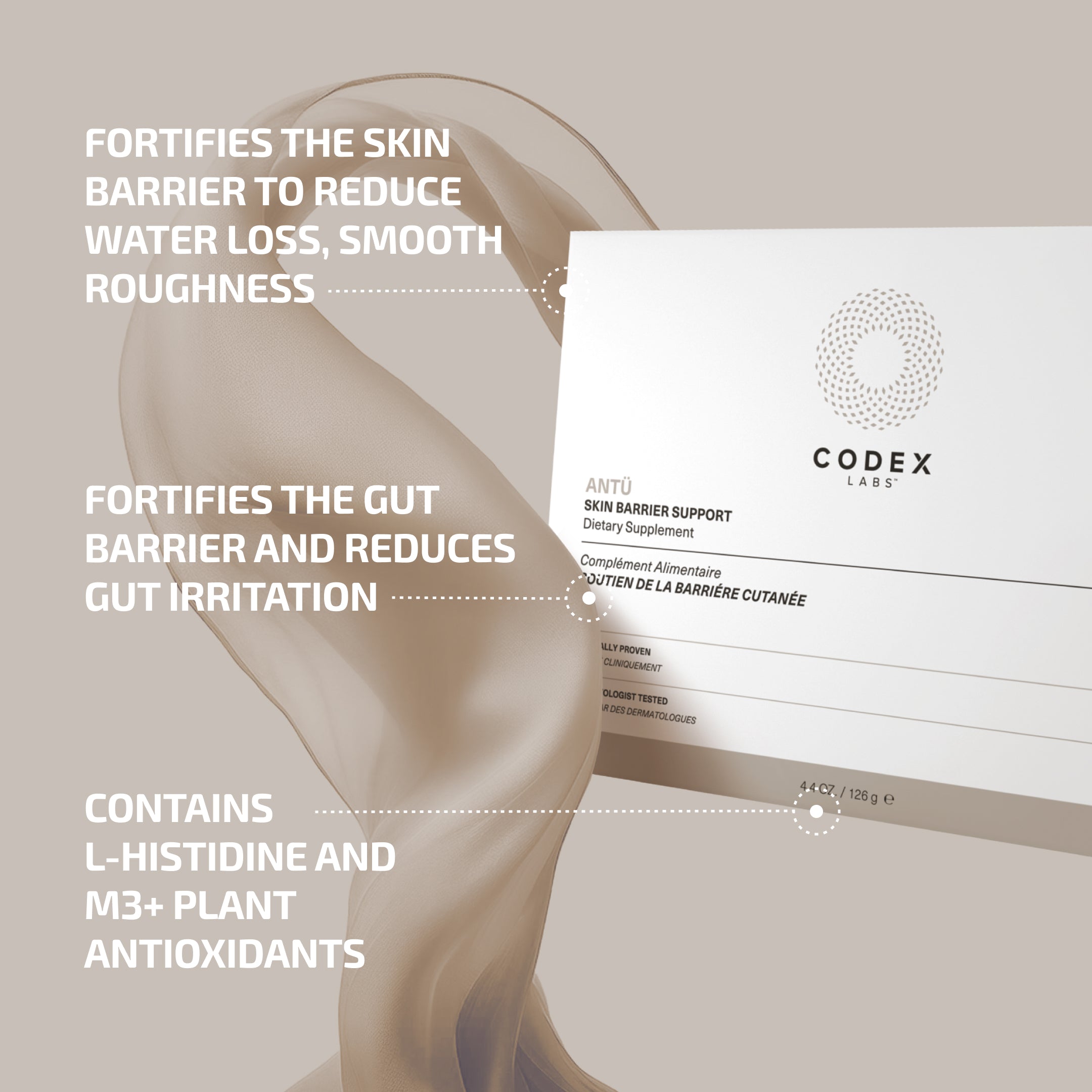Introduction:
Sun sensitivity is a common skin concern that affects millions of people worldwide. It's characterized by an increased reaction to sun exposure which oftentimes manifests as redness, burning, itching, or rashes. Although many people experience some degree of mild discomfort from prolonged sun exposure, those who suffer from sun sensitivity may experience a faster, more severe reaction. This heightened level of reactivity is oftentimes linked to a compromised skin barrier.
In this article, we'll explore the biological relationship between sun sensitivity and a compromised skin barrier. Whether you're dealing with chronic skin sensitivity to the sun or simply want to better understand how sun exposure affects the skin, this article will provide valuable insights that will help guide you on your journey to achieve healthy, resilient skin.

What is the Skin Barrier? [1]
Before diving into how the sun affects overly sensitive skin, a brief explanation of what the skin barrier, a.k.a. the stratum corneum, is and does is required. It comprises dead skin cells (corneocytes) which are held together by lipids (ceramides, cholesterol, and fatty acids, i.e., fats). It acts as a protective shield against environmental aggressors such as bacteria, pollutants, and UV radiation, while at the same time helping the skin to retain its moisture, thereby keeping it hydrated and healthy. However, when the skin barrier is compromised it becomes permeable, allowing irritants to penetrate and moisture to escape which inevitably leads to dryness, sensitivity, and inflammation.
What is Sun Sensitivity and How Does It Relate to Skin Barrier Function? [2]
Sun sensitivity, also known as photosensitivity, refers to an abnormal reaction experienced by the body to sunlight and/or artificial UV light. This condition can manifest in different ways ranging from mild irritation to severe blistering and/or rashes. Although anyone can experience sun sensitivity, those with fair skin, certain medical conditions, or those taking specific medications are particularly vulnerable.
When this barrier becomes compromised it oftentimes leads to increased sun sensitivity and a host of other skin-related issues. The connection between sun sensitivity and a compromised skin barrier is found in their interdependent nature. More particularly, a weakened skin barrier is more susceptible to damage from the sun’s UV rays which results in the skin barrier becoming even more compromised, creating an unhealthy cycle of increased sensitivity and damage.
Unlike other types of skin conditions, sun sensitivity specifically involves an exaggerated reaction to UV light which is oftentimes exacerbated by a compromised skin barrier. This unique interplay sets it apart from more traditional skin-related conditions like atopic dermatitis, acne, and psoriasis.
Causes of Sun Sensitivity and a Compromised Skin Barrier
Understanding how sun exposure affects the skin is important for effectively addressing the issue of sun sensitivity. Numerous factors can contribute to increased sun sensitivity and a compromised skin barrier including:
- Genetics: Some individuals are just genetically predisposed to having a weaker skin barrier and/or experiencing increased sun sensitivity.
- Skin Conditions: Conditions like rosacea, lupus, and eczema tend to increase the level of sun sensitivity and accelerate skin barrier deterioration.
- Medications: Certain antibiotics (ex. Bactrim®), tricyclic antidepressants, and acne medications (ex. tretinoin and isotretinoin), antihistamines, diuretics, and anti-arrhythmic drugs to treat irregular heartbeat can make the skin more reactive to sunlight. In addition, common meds like ibuprofen and birth control pills
- Environmental Factors: Pollution, extreme temperatures (cold or hot), and low humidity can negatively impact the skin barrier.
- Overexposure to UV Radiation: Prolonged or intense sun (and tanning bed) exposure can damage the skin barrier and increase sensitivity over time.
- Harsh Skincare Products: Using products with irritating/aggressive ingredients can also disrupt the skin barrier and increase sensitivity.
- Hormonal Changes: Fluctuations in hormones, particularly during pregnancy or menopause, can affect skin sensitivity.
- Diet: Certain foods and nutrient deficiencies may also cause the skin barrier to deteriorate, resulting in increased sun sensitivity.
- Stress/Anxiety: High stress levels have been shown to negatively impact skin health and potentially trigger increased sensitivity to environmental factors, including sunlight.
- Age: Unfortunately, as we age our skin naturally becomes thinner and more sensitive to external stressors such as UV radiation and air pollutants.
Symptoms and Identification [3]
Recognizing the symptoms of sun sensitivity and a compromised skin barrier is very important when crafting a strategy for properly managing the condition. Common signs include:
- Accelerated burning or reddening of the skin following minimal sun exposure.
- Experiencing an itching or stinging sensation while in the sun.
- Developing rashes and/or hives after sun exposure.
- Experiencing increased sensitivity to skincare products.
- Frequent breakouts or irritation.
- Uneven skin tone or hyperpigmentation.
- Formation of fine lines and wrinkles referred to as “photoaging”.
Sun sensitivity primarily affects areas exposed to sunlight, such as the face, neck, hands, and arms. However, a compromised skin barrier can affect the entire body, leading to overall increased sensitivity.
To differentiate sun sensitivity from other skin conditions, you should consider the timing and nature of symptoms. If negative reactions are experienced after sun exposure but improve when sunlight is avoided, it's most likely sun related. However, if symptoms persist regardless of sun exposure, other factors may be at play with a visit to a dermatologist being in order.
Also, for those individuals taking photosensitivity-causing medications, symptoms such as “phototoxicity” which presents as exaggerated sunburn and “photoallergy” in the form of an eczema-like red itchy rash are common.
Treatment Options [4]
Managing sun sensitivity and improving skin barrier function oftentimes requires a multi-faceted approach. Effective treatment options include:
- Sun Protection: The cornerstone of managing sun sensitivity involves the use of a robust sun protection strategy. This includes:
o Using broad-spectrum (UVA plus UVB) sunscreens with an SPF of at least 30
o Wearing protective clothing, including wide-brimmed hats and long sleeves when outside in the sun
o Seeking shade, especially during peak sun hours (10 am to 4 pm)
- Topical Treatments:
o Skin barrier-repairing creams containing antioxidants, ceramides, humectants (ex. hyaluronic acid and glycerin)
o Antioxidant serums with powerful antioxidants capable of neutralizing free radicals generated by the sun to protect against free radical damage
o Soothing ingredients like aloe vera or colloidal oatmeal for post-sun care
- Oral Treatments:
o Antihistamines to reduce allergic reactions to sun exposure
o Dietary supplements formulated with oxidative stress-reducing, skin barrier supporting ingredients
- Light Therapy:
o Controlled exposure to certain frequencies of UV light can sometimes help build tolerance in photosensitive individuals
- Lifestyle Changes:
o Avoiding known triggers such as certain medications or foods
o Managing stress through the use of relaxation techniques and/or exercise
o Eating a balanced diet rich in antioxidants and omega-3 fatty acids
- Post-Sun Exposure:
o Using gentle, fragrance-free cleansers
o Applying cooling compresses to soothe irritated skin
o Moisturizing with products designed for sensitive, sun-damaged skin
It's important to consult a dermatologist if you're experiencing severe or persistent sun sensitivity. They can provide personalized treatment plans and may recommend additional therapies or prescription medications.
Prevention Strategies [4]
Preventing sun sensitivity and maintaining a healthy skin barrier involves consistent care and the implementation of protective measures such as:
- Developing a Comprehensive Skincare Routine:
o Cleanse gently without stripping the skin
o Use a hydrating toner to balance pH levels
o Apply serums with barrier-supporting ingredients
o Moisturize daily to lock in hydration
o Never skip sunscreen, even on cloudy days
- Choosing the Right Sunscreen:
o Use mineral-based sunscreens with zinc oxide and/or titanium dioxide as they are typically less irritating than chemical-based sunscreens
o Reapply sunscreen every 2 hours, in general, or immediately after swimming/sweating
o Consider applying sunscreens having additional skin-soothing ingredients such as aloe vera
- Protecting Your Skin from the Inside Out:
o Eat foods that are rich in antioxidants (berries, leafy greens, nuts)
o Stay hydrated to support overall skin health
o Consider taking a dietary supplement with clinically proven ingredients that help to replenish and support the skin barrier
- Managing Stress:
o Practice stress-reduction techniques like meditation or yoga
o Make sure to get adequate amounts of sleep to help facilitate skin repair and regeneration
- Be Mindful of Your Environment:
o Use a humidifier in dry climates to support skin hydration
o Avoid extreme temperature changes when possible
Here again, for those taking photosensitivity-inducing medications, even more precautions are required, particularly with respect to sunscreen application, i.e., adoption of a “strict” sunscreen protection regimen is required. Use of a broad spectrum (UVA and UVB) sunscreen, applied at least 15-30 minutes prior to going out, coupled with diligent reapplication of sunscreen at least every two hours is needed. [5]
By implementing these types of prevention strategies, you can reduce your risk of experiencing sun sensitivity, while at the same time maintaining a healthy skin barrier.
Myths and Facts
Now, let's debunk some common myths about sun sensitivity and skin barrier function:
Myth 1: People with darker skin don't need sun protection. Fact: While darker skin has more natural protection (melanin), it can still be damaged by UV rays and experience sensitivity.
Myth 2: You can't get sun damage on a cloudy day. Fact: Up to 80% of UV rays can penetrate clouds, making sun protection necessary even on overcast days.
Myth 3: A base tan protects you from sun damage. Fact: Tanned skin = sun damaged skin. A base tan provides very little protection (equivalent to SPF 3 or 4).
Myth 4: Sunscreen is only necessary at the beach. Fact: Sun damage is cumulative. Daily sunscreen use is crucial for preventing long-term damage and photosensitivity.
Myth 5: All sunscreens are created equal. Fact: Different sunscreens offer varying levels of protection and may contain ingredients that irritate sensitive skin, especially those that contain chemical sunscreen actives.
Myth 6: Sun sensitivity is a lifelong condition. Fact: While some forms of sun sensitivity are chronic, others can be temporary or managed effectively with proper preventive care.
Myth 7: A compromised skin barrier can't be repaired. Fact: With proper care and treatment, the skin barrier can be restored, strengthened, and maintained.
FAQ
- What causes skin sensitivity to sun? Sun sensitivity can be caused by genetics, certain medications, certain skin conditions, or a compromised skin barrier.
- How does sun exposure affect the skin? Sun exposure can have an immediate impact like sunburn and long-term impact such as premature aging (photoaging) and an increased risk of developing skin cancer.
- What is the best type of sun protection for sensitive skin? Mineral-based sunscreens containing zinc oxide and/or titanium dioxide are often the best for sensitive skin, along with wearing protective clothing and seeking shade during peak times.
- How can I care for my skin after sun exposure? Gentle cleansing, applying cool compresses, and the use of soothing, hydrating products can all be used to help care for skin after sun exposure.
- Can a compromised skin barrier cause sun sensitivity? Yes, a weakened skin barrier can lead to increased sun sensitivity due to its lessened ability to protect against UV radiation.
- Are there any dietary supplements that can help with sun sensitivity? Studies suggest that dietary supplements containing certain types of skin barrier supporting ingredients like antioxidants and anti-inflammatories can help reduce sun sensitivity by strengthening the skin barrier.
- How long does it take to repair a compromised skin barrier? With consistent proper care you can experience improvements in 2-4 weeks, but full repair can typically take several months.
- Can diet affect sun sensitivity? Yes, a diet rich in antioxidants and omega-3 fatty acids may help enhance skin’s resilience to sun damage.
- Is sun sensitivity the same as a sun allergy? While related, sun sensitivity is a broader term that includes various reactions to sun exposure, whereas a sun allergy (or solar urticaria) represents a specific allergic reaction to sunlight.
- Can children develop sun sensitivity? Yes, children can develop sun sensitivity. It's crucially important to protect their delicate skin from an early age to avoid long-term damage.
Conclusion
Understanding the connection between sun sensitivity and a compromised skin barrier is important for maintaining healthy, resilient skin. Hence, by recognizing the visual signs of sun sensitivity, implementing appropriate sun protection measures, and being diligent when it comes to the repair and support of the skin barrier, individuals can significantly enhance their skin's health and reduce their sensitivity to the sun’s harmful rays over time.
Keep in mind, however, that because everyone's skin is unique what works for one person may not necessarily, or in the same way, work for another. If you're struggling with persistent sun sensitivity and/or skin barrier issues, you should not hesitate to seek professional help. Dermatologists can provide personalized advice and treatment plans tailored to your specific needs.
With the right knowledge, care, and protection, it's possible to enjoy the outdoors while keeping your skin healthy and protected. Embrace a comprehensive approach to skincare that includes sun protection and skin barrier repair/maintenance in order to realize your best, most resilient skin.
Call to Action
At Codex Labs, we take skin health very seriously. Our R&D team is constantly working to develop efficacious, biotech-based, sustainable technologies to help people, especially those with sensitive skin, effectively address their skin concerns and conditions. When it comes to addressing sun sensitivity and the skin barrier, our team of scientific experts worked hard to develop our award-winning ANTU® Collection of products.
For instance, our clinically proven ANTU® SKIN BARRIER SERUM, ANTU® SKIN BARRIER MOISTURIZER, and ANTU® OVERNIGHT REPAIR CREAM with our patented AntuComplex® technology, effectively neutralizes sun-induced free radicals to stop them from wreaking havoc on the skin barrier, while at the same time helping to repair and nourish it. These topically applied products are meant to address the issues of sun sensitivity and a compromised skin barrier from outside the body. For those looking to maximize skin barrier healing and support, there is our ANTU® SKIN BARRIER SUPPORT SUPPLEMENT, a scientifically-formulated dietary supplement containing our proprietary M3+™ antioxidant in combination with L-histidine, an amino acid that has been clinically shown to support skin barrier strength and moisture retention. This one-two, inside-out approach to skin barrier health represents our most comprehensive strategy for repairing and supporting the body’s largest defensive mechanism, your skin!
References:
- https://www.ncbi.nlm.nih.gov/pmc/articles/PMC5967208/
- https://www.fda.gov/drugs/special-features/sun-and-your-medicine#:~:text=Photosensitivity%20makes%20a%20person%20sensitive,of%20photosensitivity%20%E2%80%93%20photoallergy%20and%20phototoxicity.
- https://www.health.harvard.edu/a_to_z/sun-allergy-photosensitivity-a-to-z
- https://my.clevelandclinic.org/health/diseases/17681-sun-allergy
- Medications Making Your Skin Sun Sensitive (clevelandclinic.org)


